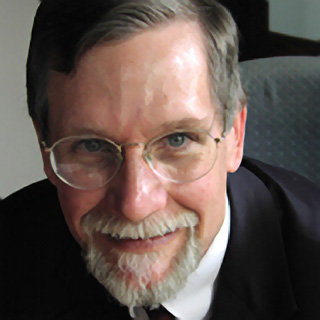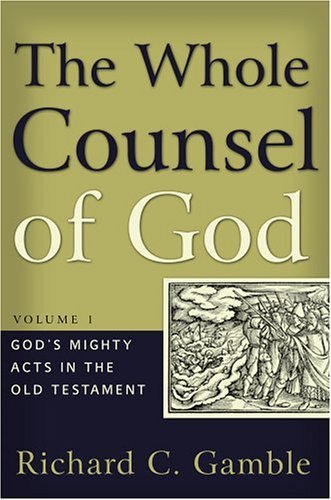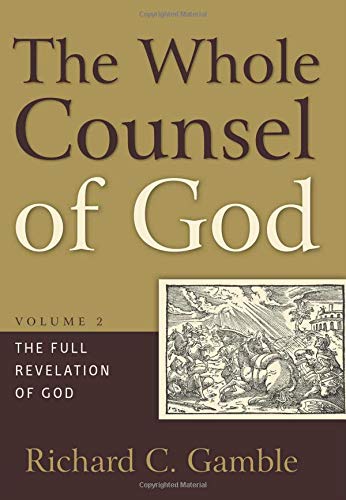An Author Interview from Books At a Glance
All theology books are not created equal. That just may be the first thing you notice about Richard Gamble’s The Whole Counsel of God. It’s a projected three volume work, and volume two is just newly released.
I’m Fred Zaspel, executive editor here at Books At a Glance, and we’re talking today with Dr. Gamble about his monumental work.
Rick, welcome, and congratulations on your new book!
Gamble:
Thank you, it’s a pleasure to be with you today.
Zaspel:
This is really a monumental achievement. Given that volume 1 was published in 2009, I assume volume 2 was at least nine years in the making – is that right?
Gamble:
It’s been a very long pregnancy but finally the baby is born.
Zaspel:
Okay, I mentioned that all theology books are not created equal. Tell us how yours is distinctive and the contribution that you hope to make.
Gamble:
Well, thanks for asking, Fred.
The two volumes that have come out are based on a Biblical Theological model rather than a loci model which is normal for Systematic Theology. The plan has been to elicit a theological method by using the historical unfolding of special revelation itself. The first volume began in Genesis and, for example, analyzed the Mosaic authorship of the Pentateuch and how Moses developed theology in those first five books. We see some of the outlines of the various doctrines, the doctrine of God, the doctrine of Humanity, the doctrine of the Church. Then we the advances that were made as Scripture continued historically with the rise of the great prophets, Isaiah and Jeremiah, and how the acorn of theology found in the Pentateuch grows into a sapling in Prophetic literature and the Historic literature, and the wisdom literature, as well, continuing through Malachi.
The second volume follows the same pattern analyzing the Gospel writers, the development of New Testament theology based on Old Testament theology showing continuity and discontinuity and eventually going through the book of Revelation.
Zaspel:
But once you’ve worked through like that, you do treat theological topics in their systematic categories, also, right?
Gamble:
I do try to do that, so it’s an amalgamation of Biblical Theology with what we would call classic Systematic Theology, as well.
Zaspel:
Tell us about your title, The Whole Counsel of God. This is obviously taken from Paul’s words in Acts chapter 20 – tell us why you chose that for your title and how it is fitting.
Gamble:
Paul is writing to Ephesian elders whom he loved. He had spent three years with them in ministry and had shared from his heart. He had opened up the Scriptures to them and it’s an emotional scene. He tells them that he’s opened to them the whole counsel of God. And I thought that that would be a marvelous title, a pretentious title; sometimes I hesitate having used such a title but it’s a title that tries to reflect what Paul did as an elder to other elders. And, in a sense, that’s what I’ve been doing for the last forty years, being a teacher and elder who is teaching other elders. Paul was the model, scripturally, but then also biographically. My first teaching position was at Westminster seminary and those words, The Whole Counsel of God, are actually in the motto of Westminster seminary, as well.
Zaspel:
I thought it was a great title for your book, particularly given your distinctive approach. It was a great stroke, I think.
Gamble:
I’m glad you like it.
Zaspel:
Usually Biblical Theology and Systematic Theology are distinct, separate courses of study in the seminary. Is this combined method of presentation what you have used in the classroom?
Gamble:
Yes. The two volumes represent classroom usage. Very much, this is how I have been doing Systematic Theology, from this Biblical Theological perspective.
Zaspel:
What are the benefits of this method of presentation?
Gamble:
Over the years I’ve taught different kinds of students and I come from the Reformed tradition. One of the things that I’ve found beneficial is that when students come from other traditions, the appeal Scripture, the appeal to exegesis has always been something that unifies us. So, whether with Baptists or other students, there’s a place where we can agree that we’ve got an inerrant Word of God and we want to see how the systematic theology flows out of Scripture rather than out of your tradition or my tradition. That’s been effective for me as I have taught different kinds of students.
Zaspel:
Where you teach, do they offer separate courses in Biblical Theology and Systematic Theology or do you just do it all together?
Gamble:
We are a very small seminary and I do all of the Systematic teaching. I’ll do electives on Biblical Theological themes and I’ve done electives on, say, Owen’s Biblical Theology, and electives on Vos and his Biblical Theology, but basically, we do our best to cover all the different loci.
Zaspel:
Take a minute and give us a brief overview of volume 1 and then of volume 2 so our listeners can see the big picture.
Gamble:
Well, volume 1 opens with a hundred pages of discussion of Theological Methods. I tell people who have bought volume 1, if they can get through the first hundred pages, the rest is going to be a breeze. In those introductory pages we look at Biblical Theology; we look at Systematic Theology; we look at how the two have interacted over the centuries; the strengths and weaknesses of different approaches. And then I jump right into what I described a few minutes ago, looking at the authors of Scripture with the presupposition through both volumes of holding to the inerrancy of Scripture. We look at the historical background of the different authors, the writing in the context of their historical period and we try to show in volume 1, the development of doctrine staying as much as I can in the Old Testament. But as a Protestant believing minister I can’t just stay in the Old Testament; sometimes I squeak into the New Testament. And likewise, in volume 2, I make footnote references to the developments that are outlined in volume 1 so that I don’t have to repeat volume 1 in volume 2.
Volume 2 begins with what would classically be called a New Testament Introduction, thinking of the audience, which is seminarians, but also I want to speak to non-seminarians and informed laypeople. So that they can see who Paul was, who Luke was, how their educational backgrounds, their social backgrounds, impacted their theology. Again, not being a liberal, saying that that’s the only thing that’s impacted their theology, seeing the work of the Holy Spirit bringing it all together. Beginning then, in volume 2 we have a New Testament introductory section which is about a quarter or a third of volume 2, and then the theological development through the rest of volume 2.
Zaspel:
Give us a look ahead, what do you hope to do in volume 3?
Gamble:
Well, volume 3 is simple. You have in volumes one and two the pearl of great price. You have the Scripture’s theology and it’s pretty easy. I begin with the apostolic fathers and move through the twentieth or twenty first century. Given the pearl of great price, how has the church been faithful or not so faithful in the development of its theological understanding? So it’s an Historical Theology, but it’s also couched in a straight Church History that people who are writing, whether it’s Augustine of Hippo or Calvin and Luther or Jürgen Multmann, we have biography and cultural and social context for the development of the doctrine.
Zaspel:
Do you have a projected date for volume 3?
Gamble:
The manuscript is basically written. I haven’t finished the last chapter, but of course it’s going to take a lot of editing. So, it shouldn’t take as long as it took volume 2 to appear.
Zaspel:
It won’t be another nine years?
Gamble:
Well, it would be my hope that Jesus will come back before volume 3, whenever it is. (Laughing) But it shouldn’t be more than a couple of years.
Zaspel:
Great. We’re looking forward to it.
We’re talking to Dr. Richard Gamble, author of the monumental work, The Whole Counsel of God. Volume 2 is just newly released, and they provide a marvelous, comprehensive approach to teaching and learning theology. Browse them for just five minutes and you’ll be impressed with their depth of learning, and you’ll also be struck by how accessible they are for all Christian readers.
Rick, thanks so much for talking to us today, and we’re eager to see volume 3 as soon as you can!
Gamble:
It’s a pleasure to have been with you, and thank you for the interview.


